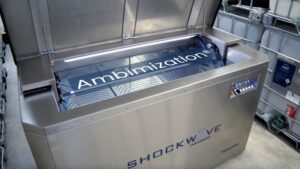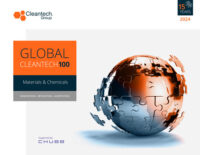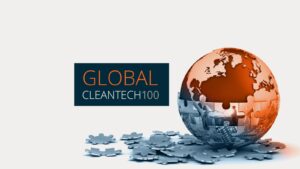Innovate or Stagnate: Cleaning Up the Manufacturing Sector
It’s Time to Clean Up
Industrial cleaning of manufacturing and process equipment typically employs the use of hydrocarbon solvents, caustic solutions and heated chemicals. These solutions are effective, however, pose a significant barrier to decarbonization strategies for many manufacturers.
Cleaning products rely heavily on fossil fuels for everything from formulation to packaging, whether it’s for domestic, commercial or industrial applications. Decarbonizing cleaning products without a trade-off in cleaning efficiency has proven to be challenging.
Among other issues, the typical industrial cleaning chemicals pose environmental hazards, safety concerns, and disposal risks. In addition, these practices are relatively resource intensive. As much as 40%-70% of a facility’s total water usage can be attributed to cleaning, in both commercial and industrial settings (UNL Engineering).
There are some so-called environmentally-friendly chemical companies that are providing low volatile organic compounds (VOCs) (i.e., eutectic solvents) but this doesn’t solve the waste problem. Approximately 70M liters of solvents are used and disposed of on a daily basis (Bioeutectics).
Now, here’s some great news: there’s a few innovators coming online seeking to decarbonize chemicals, solvents, and cleaning products. One in particular that has gained momentum is Terrafend. Its CEO is Ben Reid and they are based in the UK. I sat down with Ben Reid to discuss Terrafend.
Cleantech Group: What problem is Terrafend’s solutions addressing?
Terrafend: Terrafend is a cleantech innovator that is transforming how manufacturers clean their manufacturing equipment. Our patented methodology, Ambimization®, combines mechanical engineering with proprietary chemistry to replace harmful solvents and their alternatives.
Ambimization® makes cleaning processes safer, faster, and more effective, and delivers immediate sustainability benefits including the reduction of hazardous waste, VOCs, and carbon dioxide (CO2) emissions.

Cleantech Group: What is your target market? Who are relevant players that need to hear about this tech?
Terrafend: Our primary target markets are global manufacturing companies in the coatings and automotive sectors. We have successfully implemented Ambimization® across various sites in Europe and the Middle East, collaborating with industry leaders such as AkzoNobel, Sherwin-Williams, Toyota, and Jaguar Land Rover.
We work with a range of stakeholders across these businesses including regional and global H&S, environmental and sustainability champions, technical and innovation leaders, and process and operations experts.
Cleantech Group: Have you performed a lifecycle assessment to address emissions and additional resource reductions?
Terrafend: Yes, we have conducted lifecycle assessments for several customers, revealing substantial sustainability benefits. For example, a recent LCA for a global coatings manufacturer, conducted by an independent environmental consultant, estimated impressive results for just one site and one application over a period of 12 months:
- VOC content: 97.56% reduction, equating to 46,830 L or 40,524 kg savings;
- Solvents: 48,000 L savings;
- Waste: 23,694 kg reduction, representing a 57% reduction by weight; and
- Carbon: average GHG emissions of 9.4 tCO2e/year
- Compared to 76.4 tCO2e/year from solvent-based cleaning—an 87% emissions reduction
Cleantech Group: Is there an efficiency trade-off compared to incumbent tech?
Terrafend: Absolutely not. Ambimization® improves the safety and sustainability of the cleaning process without compromising on quality or speed. Ambimization® can clean the hardest to clean contaminates including epoxy, urethane acrylates, alkyd, and polyurethanes as well as water sensitive or hydrophobic compounds.
Feedback from our customers demonstrates that our solution not only provides a superior clean compared to solvents but also operates faster. For example, we reduced cleaning times from 45 minutes to just 12 minutes per vessel for one of our coatings customers, translating to a time savings of approximately 2,200 hours per year for one site and one application. This boost in efficiency is crucial for our customers’ operational effectiveness.
Cleantech Group: What does industry need to do to prepare for this technology?
Terrafend: Industries can transition by simply replacing traditional solvent-based cleaning processes, with Terrafend’s machines and proprietary water-based fluids. To facilitate this transition, industries need to assess the effectiveness and efficiency of Ambimization® and understand the tangible benefits of switching. Raising awareness of these benefits within the industry will be key to accelerating adoption.
Cleantech Group: Where are you in your roadmap development?
Terrafend: Terrafend has already established a comprehensive suite of technologies for the coatings industry, covering the cleaning of small parts, manufacturing tools, fixed vessels, dissolvers, movable vessels, and metal totes. In the automotive sector, Ambimization® is employed to clean small mechanical parts, spray guns, and paint overspray from grids, jigs, and skids.
Looking ahead, we plan to extend Ambimization® to other sectors, replacing traditional solvent, caustic, and heat-based cleaning processes. The maritime sector is our next target, with aerospace, general industrial, and packaging industries likely to follow.
Cleantech Group: What do the next 5-10 years look like?
Terrafend: We anticipate that many industries will have completely transitioned to our technology, making solvent-based cleaning processes a thing of the past. There’s a growing focus on sustainable industrial cleaning practices, including:
- Using biodegradable, eco-friendly cleaning products with reduced toxicity;
- Optimizing cleaning processes to minimize water and energy use;
- Implementing closed-loop cleaning systems that recycle and reuse water.
Summary
- Ambimization® is a drop-in cleaning solution for coatings and automotive manufacturing equipment that improves process efficiency and reduces environmental and safety risks associated with traditional industrial cleaning practices
- Ambimization® results in significant reductions: 87% carbon emissions, 3/4 time per cleaning task, and 57% waste over a 12-month period
- Within 5-10 years, solvent-based cleaning practices will be outdated
A Win-Win for Manufacturers and the Planet
All of us at Cleantech Group get excited when a solution comes online that not only embodies what it means to be a cleantech company, but also translates into resource consumption and cost reductions for its customers. Technologies like this not only enable a low-carbon economy, but also demonstrate that technological innovation doesn’t have to come at the expense of process efficiency.
Do you know any cleantech innovators focused on industrial cleaning decarbonization? Let us know!



